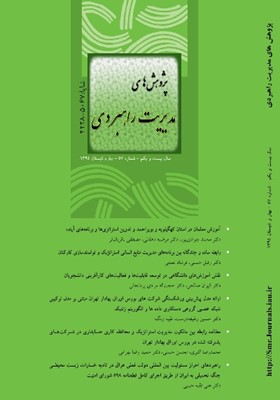راهبردهای احراز مسئولیت بین المللی دولت فعلی عراق در تادیه خسارات زیست محیطی جنگ تحمیلی به ایران از طریق اجرای کامل قطعنامه 598 شورای امنیت
محورهای موضوعی : پژوهش های مدیریت راهبردی
1 - استادیار حقوق ، دانشگاه آزاد اسلامی واحدتهران جنوب
کلید واژه:
چکیده مقاله :
شورای امنیت به عنوان یکی از مهمترین و اساسی ترین ارکان سازمان ملل متحد، مسئولیت اولیه حفظ صلح و امنیت بینالمللی را بر دوش دارد.رویه شورای امنیت در برخورد با مسایل مربوط به تهاجم عراق به ایران و موارد پیرامونی آن به نظر تبعیض آمیز می رسد چرا که به رغم اینکه ادله کافی برای متجاوز دانستن عراق به عنوان متجاوز در اختیار شورا بوده، اصولاً پذیرش موضوع تجاوز و متجاوز، خود را تا پایان جنگ به تجاهل زده است و واکنشی نشان نداده است. مسلماً اجرای تصمیمات شورای امنیت بر طبق فصل هفتم منشور به منظور حفظ یا اعاده صلح و امنیت بین المللی و مستنداً به مواد 25 و 103 منشور ملل متحد این قطعنامه لازم الاتباع می باشد و بر اساس بند 10 قطعنامه 598 که تصریح کرده در صورت نیاز شورای امنیت جهت اجرای قطعنامه تشکیل جلسه میدهد، لذا میتوان گفت که سازمان ملل متحد و شورای امنیت در قبال اجرای کامل قطعنامه مزبور میبایست مسئولیت و تعهدات خود را در این خصوص ایفاء کنند. در این مقاله سعی شده است با بهرهگیری از قواعد حقوق بین الملل، ضمن تبیین وضعیت حقوقی فعلی قطعنامه 598، راهبردهای مطالبه خسارات زیست محیطی جنگ تحمیلی از طریق اجرای کامل قطعنامه 598 را روشن و تبیین کند.
The Security Council as one of the most important pillar of United Nation has primarily the responsibility of maintenance of international peace and security. The practice of Security Council in dealing with issues related to Iraq’s aggression against Iran and its relevant problems seems discriminatory. Since despite sufficient evident for recognizing Iraq as Aggressor, the Security Council has not reacted to recognize the subject of aggression and aggressor up to end of the imposed war. Surly the enforcement of the Security Council resolution according to chapter VII of the United Nation charter in order to maintaining or restoration of international peace and security and according to Articles 25 and 103 of the charter as well as the Article 10 of the resolution 598 which stipulating holding the secession of Security Council in term of necessity, the afore mentioned resolution is binding. So it can be said, the United Nation and Security Council should do their responsibility and obligation regarding the implementation of this resolution. Explaining the juridical status of the Resolution 598, this paper by applying the principles of international law tries to specify the strategies of claiming the environmental damage due to imposed war through full implementation of resolution 598.

